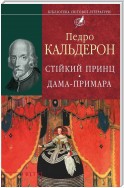Pedro Calderón de la Barca

Pedro Calderón de la Barca y Barreda González de Henao Ruiz de Blasco y Riaño usually referred as Pedro Calderón de la Barca (17 January 1600 – 25 May 1681), was a dramatist, poet and writer of the Spanish Golden Age. During certain periods of his life he was also a soldier and a Roman Catholic priest. Born when the Spanish Golden Age theatre was being defined by Lope de Vega, he developed it further, his work being regarded as the culmination of the Spanish Baroque theatre. As such, he is regarded as one of Spain's foremost dramatists and one of the finest playwrights of world literature.
Calderón was born in Madrid. His mother, who was of Flemish descent, died in 1610; his father, an hidalgo of Cantabrian origins who was secretary to the treasury, died in 1615. Calderón was educated at the Jesuit College in Madrid, the Colegio Imperial, with a view to taking orders; but instead, he studied law at Salamanca.
Between 1620 and 1622 Calderón won several poetry contests in honor of St Isidore at Madrid. Calderón's debut as a playwright was Amor, honor y poder, performed at the Royal Palace on 29 June 1623. This was followed by two other plays that same year: La selva confusa and Los Macabeos. Over the next two decades, Calderón wrote more than 70 plays, the majority of which were secular dramas written for the commercial theatres.
According to one of his biographers, Vera Tassis, Calderón served with the Spanish army in Italy and Flanders between 1625 and 1635; but this statement is contradicted by numerous legal documents indicating that Calderón resided at Madrid during these years. Early in 1629 one of his brothers was stabbed by an actor who took sanctuary in a convent; Calderón, accompanied by another brother and some constables, broke into the cloister and attempted to seize the criminal (one of the nuns happened to be the daughter of fellow dramatist Lope de Vega). The fashionable preacher, Hortensio Félix Paravicino, denounced Calderón's actions in a sermon preached before King Philip IV; Calderón retorted by introducing into El príncipe constante a mocking reference to Paravicino's florid oratory. Calderón was punished with three days of house arrest, and forced to remove the offending line from the play.
By the time Lope de Vega died in 1635, Calderón was recognized as the foremost Spanish dramatist of the age. Calderón had also gained considerable favour in the court, and in 1636-1637 he was made a knight of the order of Santiago by Philip IV, who had already commissioned from him a series of spectacular plays for the royal theatre in the newly built Buen Retiro palace.
 čeština
čeština Deutsch
Deutsch français
français magyar
magyar polski
polski русский
русский English
English Azərbaycan
Azərbaycan беларуская
беларуская italiano
italiano ქართული
ქართული қазақ
қазақ Nederlands
Nederlands português
português slovenčina
slovenčina español
español 中文
中文 українська
українська








